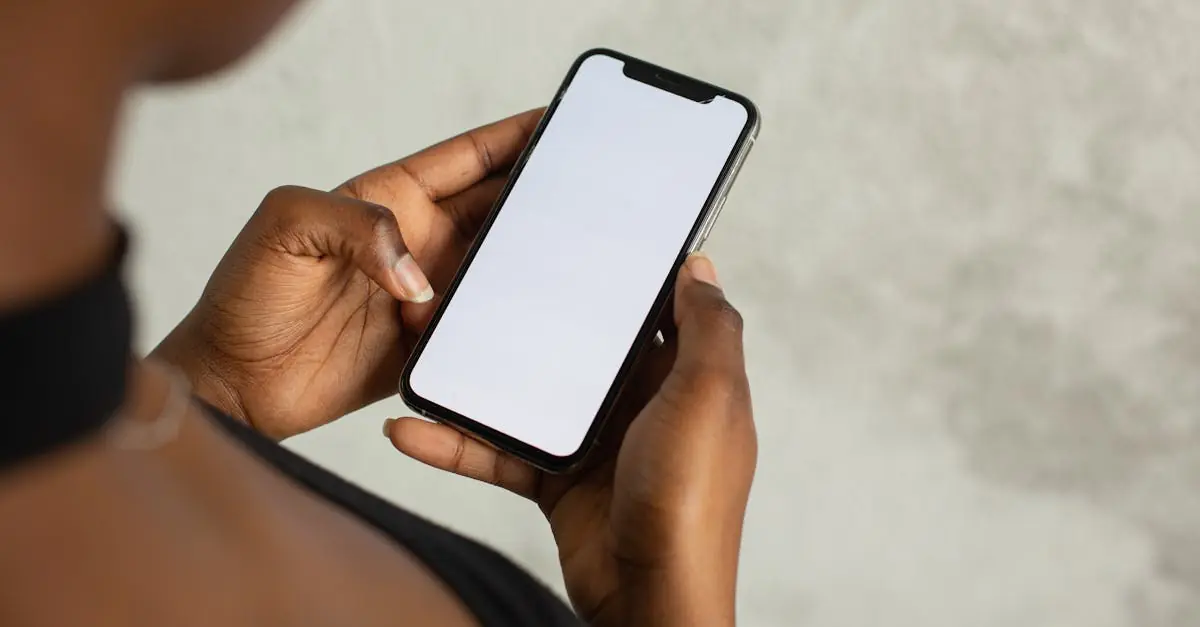In a world where everyone’s glued to their smartphones, mobile loyalty apps have emerged as the dazzling knights in shining armor for businesses and consumers alike. These apps don’t just reward loyal customers; they transform mundane shopping trips into treasure hunts packed with discounts, freebies, and exclusive perks. Who wouldn’t want to turn a casual coffee run into a mini-adventure with rewards that could rival a scavenger hunt?
Table of Contents
ToggleOverview of Mobile Loyalty Apps
Mobile loyalty apps serve as valuable tools for businesses, establishing a direct connection with customers. These apps enhance engagement by providing incentives that encourage repeat purchases. In 2023, approximately 75% of consumers showed a preference for brands offering rewards programs through mobile platforms.
Users can easily access rewards, track points, and redeem offers directly from their smartphones. Increased convenience often leads to higher customer satisfaction and brand loyalty. Additionally, businesses gain insights into customer behavior, allowing for targeted marketing efforts.
Exclusive promotions, personalized offers, and early access to sales attract users to download and actively use these apps. Notably, restaurants and retail chains report increased sales after implementing mobile loyalty programs. A successful app not only retains current customers but also attracts new ones seeking added value through loyalty rewards.
Understanding user demographics aids businesses in tailoring their rewards. Customers aged 18 to 34 are more likely to engage with mobile loyalty initiatives, highlighting the importance of appealing to younger consumers. Enhanced user experience through intuitive interfaces and engaging features encourages more frequent interaction with the app.
Mobile loyalty apps transform customer relationships by providing immediate rewards and personalized experiences. Businesses benefit from improved customer retention rates and enriched data analytics, while consumers enjoy rewards tailored to their preferences. The future of mobile loyalty programs looks promising as companies continue to innovate ways to engage and satisfy their customer base.
Benefits of Mobile Loyalty Apps
Mobile loyalty apps offer numerous advantages for both consumers and businesses. These tools engage customers while enhancing their shopping experiences.
Increased Customer Engagement
Mobile loyalty apps significantly boost customer engagement. Businesses reporting active rewards programs see a noticeable increase in repeat purchases. Engaging customers through notifications and exclusive deals fosters loyalty. Studies indicate around 75% of consumers prefer brands with mobile loyalty programs. Frequent interactions with the app strengthen connections. Customers enjoy discovering offers tailored to their preferences, making shopping feel like an adventure. This strategy transforms casual shoppers into brand advocates, ultimately driving sales.
Enhanced Personalization
Personalization is a key benefit of mobile loyalty apps. Businesses utilize consumer data to create targeted offers that resonate with users. Customers appreciate recommendations based on previous purchases and preferences. This tailored approach leads to higher satisfaction rates. With mobile apps, brands can deliver time-sensitive promotions directly to customers, increasing urgency and relevance. Demographic insights pinpoint the interests of users aged 18 to 34, a group likely to engage with personalized content. Crafting a unique experience encourages loyalty and maximizes the effectiveness of marketing efforts.
Types of Mobile Loyalty Apps
Mobile loyalty apps come in various forms, each designed to enhance customer engagement and satisfaction. Understanding these types helps businesses choose the most effective approach.
Point-Based Systems
Point-based systems reward customers with points for every purchase. Accumulating points leads to discounts or free items, keeping users motivated to return. Businesses can track customer spending patterns through these systems, enabling tailored marketing strategies. For example, a coffee shop may offer one point per dollar spent, and after accumulating 100 points, users receive a free drink. This straightforward approach appeals to a wide demographic, fostering repeat business.
Tiered Rewards Programs
Tiered rewards programs incentivize increased spending by offering different levels of rewards. Customers ascend through tiers based on their purchases, unlocking exclusive benefits at each level. A retail brand might feature bronze, silver, and gold levels, providing discounts and early access to sales based on tier status. This strategy creates a sense of achievement and encourages users to spend more to reach higher tiers. Enhanced loyalty results from the combination of personalized rewards and the desire to maintain tier status.
Implementation Strategies
Implementing mobile loyalty apps requires careful attention to design and marketing strategies. Focusing on a user-friendly approach ensures customers engage with the app effectively.
User-Friendly Design
Intuitive interfaces enhance user experience. Easy navigation keeps customers satisfied. A visually appealing layout attracts users, promoting frequent app visits. Businesses should prioritize fast load times and accessibility. Incorporating clear prompts for rewards availability simplifies the process. Customizable features allow users to tailor their experience, further increasing engagement. Feedback mechanisms help refine the design based on user preferences, fostering a sense of connection.
Effective Marketing Techniques
Strategic marketing boosts app download rates and usage. Promotions like limited-time offers generate excitement and urgency. Personalized notifications based on user behavior drive app interaction. Utilizing social media channels increases visibility and encourages sharing among peers. Collaborating with influencers targets younger demographics who value recommendations. Regularly analyzing engagement metrics informs adjustments in marketing strategies, ensuring continued relevance. Tailoring campaigns to specific audience segments optimizes effectiveness and enhances user loyalty.
Challenges in Mobile Loyalty Apps
Mobile loyalty apps face several challenges that can hinder their effectiveness. Data privacy and user retention are key issues that need attention.
Data Privacy Concerns
Consumers are increasingly cautious about sharing personal information. Mobile loyalty apps often collect extensive data to create personalized experiences. However, if users feel their data is at risk, they may avoid using these apps entirely. In fact, a survey indicates that 70% of consumers express concern about data breaches. Companies should prioritize transparent privacy policies and secure data handling practices to build trust. Implementing clear opt-in processes can enhance user comfort. Respecting user data and providing options for data management remains crucial for app success.
User Retention Issues
Retaining users in mobile loyalty apps proves challenging for many businesses. Many apps experience high uninstall rates shortly after download. Users often need consistent value from these apps to remain engaged. According to studies, around 40% of users abandon loyalty apps within three months. Offering tailored rewards and regular incentives can help maintain user interest. Additionally, communicating regularly through personalized notifications enhances engagement. To keep users active, businesses must continually improve the app experience and adjust offerings based on user feedback.
Conclusion
Mobile loyalty apps are reshaping the way businesses connect with their customers. By offering personalized experiences and immediate rewards, these apps foster deeper engagement and loyalty. The shift towards digital rewards programs aligns with consumer preferences for convenience and instant gratification.
As technology continues to evolve, companies must stay ahead by addressing privacy concerns and enhancing user retention strategies. With the right approach, mobile loyalty apps can drive significant growth and create lasting relationships between brands and consumers. The future of customer loyalty is undoubtedly mobile, and businesses that embrace this trend will reap the benefits.







